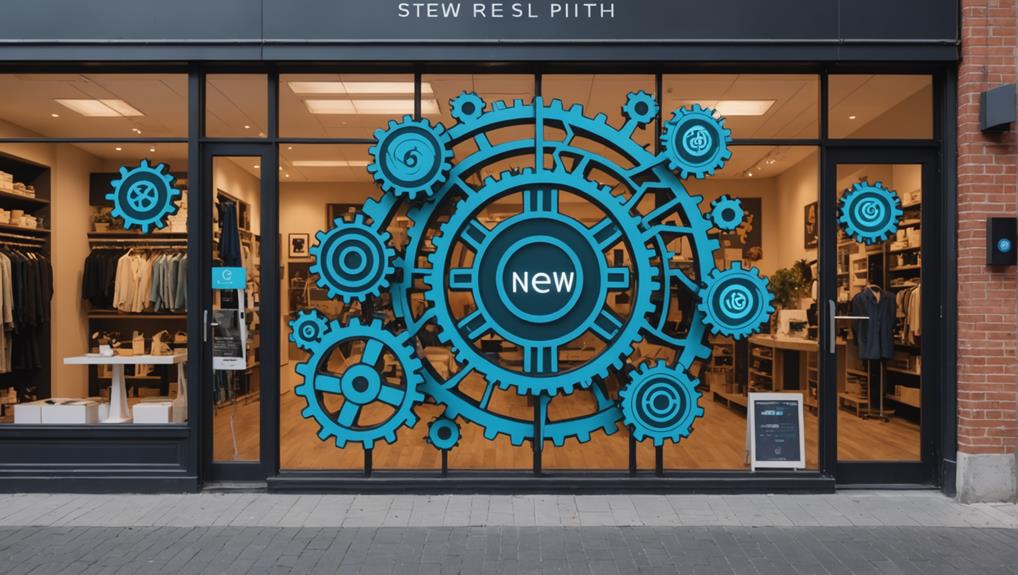Key Takeaways
- AI integration improves small business efficiency, saving nearly 20 hours a month on business processes.
- AI-powered websites can enhance customer service, satisfaction, and engagement levels.
- Automating financial and HR tasks on a website can significantly reduce operational costs and errors.
- AI can increase sales revenue and conversion rates through personalized marketing strategies.
- Adopting AI in a website offers a competitive advantage and future-proofs small businesses.
Understanding AI and Automation
Why are AI and automation becoming increasingly crucial for small businesses? The answer lies in their ability to replicate human intelligence processes and perform tasks with minimal human involvement, thereby enhancing effectiveness and productivity.
According to recent surveys, 55% of small business owners anticipate saving nearly 20 hours a month with AI, proof of its time-saving attributes. This is a significant advantage for businesses aiming for operational efficiency and improved bottom lines.
Furthermore, AI enables small businesses to compete with larger enterprises by optimizing operations and customer service. AI’s capabilities to analyze vast amounts of data, identify patterns, and make predictions allow businesses to anticipate customer needs, enabling them to deliver personalized services more effectively.
The integration of AI into marketing and sales functions can increase effectiveness, revenue, and customer engagement. Automation minimizes errors and optimizes work efficiency, making it a valuable asset in managing routine tasks. Intelligent automation, the fusion of AI and automation, offers an even more significant advantage, providing strategic insights that can inform decision-making.
Opportunities With AI Integration
A staggering 50% of small businesses are predicted to adopt AI by 2025, indicating a significant change in how small enterprises operate and compete. This trend shows a pivot towards efficiency and strategic growth, as AI integration can save nearly 20 hours a month on business processes, a fact noted by 55% of business owners.
The opportunities for AI integration are manifold. It not only saves time but also money, enabling small businesses to operate at the level of larger enterprises. The world of customer service, for instance, can benefit immensely from AI automation. AI can streamline processes, improve response times, and enrich customer engagement, leading to increased customer satisfaction and, ultimately, higher revenue.
However, the path towards AI integration is not without its challenges. About 23% of businesses grapple with where to begin, highlighting the need for a clear, strategic plan. Here, proven AI use cases in marketing, sales, and customer service can serve as reliable guides, highlighting the potential of AI to transform small businesses and level the competitive field.
Essential AI Tools for Businesses

How can small businesses utilize the power of AI to improve their operations and competitiveness? One crucial tool is ChatGPT, which can instantly generate write-ups, streamline communication efforts effectively, and boost customer support. Such automation reduces the need for extensive human involvement, thereby saving time and resources.
Moreover, AI tools can help level the playing field for small businesses. In today’s tight labor market, these tools catalyze efficiency and productivity, enabling companies to compete with larger enterprises. This is especially relevant given the rising labor costs, which add financial pressure to small businesses.
Enhancing Sales Through AI
In today’s competitive market, the strategic application of AI has proven game-changing in enhancing sales for small businesses. Utilizing AI for revenue generation, optimizing conversion rates, and formulating tailored marketing strategies can significantly boost sales performance. Let’s delve into how AI-driven tools can streamline sales processes, maximize effectiveness, and lead to substantial growth in business revenue.
AI-Driven Revenue Generation
Improving sales performance through AI-powered revenue generation has emerged as an effective strategy for small businesses. By integrating AI tools into their sales process, small businesses can experience significant growth in their revenue streams. This results from the ability of AI to increase sales by up to 50%, elevate customer engagement by 54%, and optimize lead generation efficiency by 58%.
AI tools also elevate sales productivity by 34%, allowing businesses to achieve more with the same resources. They decrease response times by 80%, leading to customer satisfaction, and drive tailored customer interactions, which can increase conversion rates by 72%.
| AI-Driven Revenue Generation Benefits | Statistic | Impact |
|---|---|---|
| Increase in Sales | Up to 50% | Higher Revenue |
| Elevation in Customer Engagement | 54% | Stronger Customer Relationships |
| Optimization in Lead Generation Efficiency | 58% | More Qualified Leads |
These statistics demonstrate the potent potential of AI for small businesses. AI tools can advance revenue generation, nurture stronger customer relationships, and increase operational efficiency. In the next section, we will discuss how these tools can further optimize conversion rates.
Optimizing Conversion Rates
Utilizing the power of artificial intelligence can optimize conversion rates for small businesses. AI-driven chatbots, for example, improve customer support by offering instant responses and increasing conversion rates by up to 10%. The ability to provide immediate assistance is crucial in today’s fast-paced, digital realm, where customers anticipate prompt solutions.
Additionally, AI algorithms can analyze customer behavior and use this information to tailor product recommendations. This systematic approach enhances sales by an average of 29%, showcasing the efficacy of AI in comprehending and leveraging customer behavior patterns.
AI’s effectiveness extends to email marketing campaigns, which have exhibited a 16% higher open rate and a 26% higher click-through rate when powered by AI. These statistics highlight the role of AI in crafting compelling content that resonates with customers, thereby driving conversions.
AI tools can also optimize website design based on customer behavior data, resulting in a 15% increase in conversion rates. This technology-driven approach ensures a user-friendly website, enriching the customer’s experience and, ultimately, boosting sales productivity. Indeed, small businesses utilizing AI for sales are experiencing a 50% surge in leads and a 40% increase in sales efficiency, confirming AI’s significance in maximizing conversion rates.
Personalized Marketing Strategies
Often underestimated, AI automation’s role in tailored marketing is a game-changer for small businesses. It is a crucial tool that can significantly increase sales by offering content tailored to unique customer preferences and behaviors.
Implementing AI in marketing strategies can lead to several strategic advantages:
- A potential 20% increase in sales on average demonstrates the ROI of investing in AI.
- A higher conversion rate, up to 15% more compared to generic marketing campaigns, optimizing your marketing efforts.
- Utilizing AI tools to analyze customer data can enhance customer engagement by 45%, improving your relationship with your clients.
- A reduction in customer acquisition costs by 25%, improving your bottom line.
- The ability to create tailored recommendations will further improve customer engagement and loyalty.
Financial Management Automation

The integration of AI in financial management can be essential for small businesses seeking to optimize their operations. By automating processes such as budgeting and invoicing, companies can significantly reduce manual labor, improve accuracy, and generate up-to-date financial insights. This thoughtful approach not only enhances efficiency and reduces errors but also lays the groundwork for data-driven decision-making, contributing to the long-term sustainability of the business.
Streamlining Budget Processes
Embracing AI automation in financial management can catalyze small businesses aiming to optimize effectiveness and precision in their budget processes. AI-powered tools simplify intricate financial tasks, allowing for improved resource allocation and, consequently, enhanced client service.
Here are five compelling reasons for small businesses to automate their budget processes with AI:
- Efficiency Improvement: Automation can save up to 120 hours annually, leaving more time for strategic tasks.
- Error Minimization: AI tools minimize manual errors, increasing the precision of financial data.
- Cost Reduction: Businesses can achieve an average of 30% reduction in operational costs.
- Data-Driven Decisions: AI improves forecasting ability, enabling better business planning.
- Growth Focus: With automated financial management, businesses can concentrate on client satisfaction and growth strategies.
Automating Invoice Systems
A staggering 85% decrease in manual errors can be achieved by automating invoice systems with AI. This strategic move not only saves small businesses an average of 11 hours per week but also increases productivity by a significant 29%. This advanced approach, commonly known as AI for small, allows businesses to process invoices four times faster, improving cash flow management by up to 23%.
The implementation of AI in financial management streamlines processes increases accuracy and ensures timely payments. This leads to improved business efficiency and profitability and a 21% reduction in operational costs.
The following table illustrates the profound impact of AI automation on small businesses:
| Benefit of Automation | Statistics |
|---|---|
| Decrease in manual errors | 85% |
| Time savings per week | 11 hours |
| Productivity increase | 29% |
| Enhancement in cash flow management | 23% |
| Reduction in operating costs | 21% |
Streamlining HR With AI
Incorporating AI into your HR department can significantly modernize and streamline various processes. This adoption of AI can lead to significant cost savings and productivity increases, transforming your HR operations from a cost center to a strategic hub.
AI can boost HR efficiency in several ways. Here are five key benefits of implementing AI in your HR processes:
- Automating tasks: AI can automate routine tasks such as resume screening and candidate sourcing, saving valuable time and resources.
- Cost and productivity enhancements: AI can help small businesses achieve up to 30% cost savings and increase productivity by 40%.
- Improving talent management: AI tools can assist in talent acquisition, onboarding, and employee engagement.
- Reducing bias: AI can minimize bias in recruitment processes and improve diversity and inclusion efforts.
- Focusing on strategic initiatives: AI automation in HR can help small businesses focus on strategic initiatives and employee development, driving business growth.
Marketing Strategies With AI

Harnessing the power of Artificial Intelligence in marketing strategies offers a variety of advantages for small enterprises. A strategic application of AI can result in a 20% rise in sales revenue, enabling businesses to increase sales and prosper in today’s competitive market. AI tools not only aid in effective communication with customers but also assist in managing marketing campaigns and finalizing deals, thereby boosting conversion rates by 30%.
Small businesses can further enrich customer experiences by integrating AI into their sales processes, which in turn can elevate revenue by 15%. This tech-savvy approach enables enterprises to better serve their customers by predicting their needs and delivering tailored experiences. Moreover, AI-driven marketing strategies have demonstrated an increase in customer engagement by 25%, fostering a stronger relationship between the business and its customers.
Therefore, AI automation, when strategically incorporated into a small business’s website, can substantially elevate sales, enhance customer engagement, and contribute to overall business growth. It’s time for small enterprises to tap into the power of AI and unleash their potential.
Overcoming AI Implementation Challenges
While numerous small businesses acknowledge the potential benefits of AI automation, they often grapple with challenges such as initial investment costs, data security issues, and workforce adaptation. Acknowledging these obstacles is the primary step for small business owners keen to utilize the power of AI.
To overcome these challenges, consider the following strategies:
- *Plan for Primary Investment*: Set aside funds for necessary hardware, software, and training resources. This investment will pay dividends in efficiency and productivity.
- *Invest in Data Security*: Implement robust security measures to protect the large volumes of data managed by AI systems.
- *Upskill the Workforce*: Offer training to help your team adapt to new AI tools and understand their advantages.
- *Address Ethical Concerns*: Mitigate biases in AI algorithms by ensuring diverse input during the design and testing stages.
- *Manage Resistance to Change*: Foster a culture of innovation and demonstrate the positive impact of AI on tasks and workflows.
Impact of AI on Operations

Having addressed the challenges and proposed solutions for AI implementation in small businesses, it is also important to discuss its impact on operations. AI integration has dramatically improved work efficiency by reducing errors and fostering accuracy. Companies can utilize this accuracy to streamline their operations and deliver superior customer experiences.
AI also enables remote work options and global talent collaboration. These aspects improve businesses’ operational flexibility and result in significant cost savings. By managing remote workforces effectively and reducing overhead costs, small businesses can allocate their resources to customer-focused operations.
Furthermore, AI plays a key role in improving project management and employee performance tracking. By enhancing team collaboration and communication, AI tools significantly increase overall productivity in business operations. The strategic implementation of AI can lead to a more cohesive, efficient, and customer-centric operational framework.
Role of AI in Customer Service
The groundbreaking power of AI is reshaping the landscape of client service, providing small businesses with a competitive edge in an increasingly digital marketplace. AI adoption in customer service is strategic, giving businesses a crucial edge through rapid response times, customized interactions, and cost-effective operations.
The analytical advantages of AI in customer service are numerous:
- AI can potentially increase customer satisfaction by 25% by 2025, making businesses more competitive.
- AI chatbots can handle 80% of routine customer inquiries, reducing response time by 90% and freeing up human resources for more intricate tasks.
- 67% of customers prefer self-service options powered by AI, which provide quick and efficient resolutions to their issues.
- AI-driven customer service can result in a 30% cost reduction compared to traditional methods, making it an economically feasible option for small businesses.
- Tailored customer interactions through AI can increase sales by up to 15%, opening up new revenue streams.
Implementing AI in customer service is a tech-savvy move that can provide substantial operational efficiency and customer satisfaction, essential for any small business aiming to thrive in the digital era.
Future Prospects of AI Adoption

As we look towards the future, the adoption of AI within small businesses presents both compelling advantages and notable challenges. The focus must now shift to the strategic implementation of AI tools to improve operational efficiency, customer engagement, and overall revenue growth. However, understanding the potential obstacles in initiating AI integration is critical to utilizing its full potential and leveling the playing field with larger enterprises.
AI Adoption Advantages
Tapping into AI’s potential presents an alluring opportunity for small business proprietors. A surge in adoption is anticipated in the upcoming years. Utilizing AI tools can transform the way small businesses function, granting them the competitive advantage necessary to prosper in today’s market.
AI adoption offers numerous benefits:
- Increased Efficiency: AI integration in marketing and sales can streamline processes, leading to improved efficiency and revenue.
- Time-saving: AI automation tools can save small business proprietors nearly 20 hours a month, boosting productivity.
- Competitive Advantage: Small businesses deploying AI can compete effectively with larger enterprises.
- Operational Enhancements: Incorporating AI in diverse business functions offers significant operational enhancements.
- Future-Proofing: With over 50% of small businesses projected to adopt AI by 2025, early adoption can ensure your business remains ahead of the curve.
Utilizing AI’s advantages can enable small businesses to deliver excellent services to their customers. Embracing AI is more than just following a trend; it’s a strategic move that can reshape your business’s future. AI adoption is not merely an option but a necessity in the contemporary business landscape.
Potential AI Challenges
Despite the promising growth path, integrating AI into small businesses is not without its hurdles. A significant 23% of companies struggle with initiating AI integration, indicating a necessity for more structured, well-planned approaches to AI adoption.
Utilizing AI requires a profound understanding of the technology and its potential applications, which can be daunting for some small businesses. However, the proven success of AI in areas like marketing, sales, and customer service demonstrates its potential for driving efficiency and revenue growth. Indeed, AI tools can improve customer experiences, increase engagement, and enable small businesses to compete effectively with larger enterprises.
| Challenges of AI Adoption | Potential Solutions |
|---|---|
| Uncertainty about where to start | Develop a strategic game plan for AI adoption |
| Limited understanding of AI technology | Invest in education and training |
| Fear of the unknown | Reference established AI use cases |
| Concerns about cost | Explore cost-effective, scalable AI solutions |
| Need for technical expertise | Seek advice from AI consultants or tech-savvy partners |
With the proper guidance and meticulous planning, small businesses can overcome these challenges and utilize the power of AI to elevate their operational efficiency and competitive edge.
Frequently Asked Questions
Why Is AI Good for Small Businesses?
AI is beneficial for small businesses as it improves efficiency, competitiveness, and revenue generation. It automates tasks, freeing up time, and provides data-driven insights, enabling better decision-making and customer service.
Is It Necessary to Have a Website as a Small Business?
Yes, small businesses must have a website. It provides visibility, establishes credibility, and increases customer engagement. Incorporating basic AI automation can further tailor user experiences and potentially drive revenue growth.
Is Automation Necessary for Small Businesses?
Yes, automation is crucial for small businesses. It streamlines operations, boosts efficiency, and fosters competitiveness. By implementing AI, small businesses can operate akin to larger enterprises, improving marketing, sales, and customer service.
Why Is a Website Important for a Business?
A website akin to a global storefront elevates credibility, broadens audience reach, and offers a platform for customer interaction. Incorporating basic AI automation can improve user experience, streamline operations, and propel business growth.
Streamlining Operations with Launched AI AutomationConclusion

Erik Remmel is a co-founder of Launched, a platform that helps businesses grow through AI-powered marketing, automation, and lead generation. He focuses on building scalable systems that convert cold leads into customers while streamlining operations with smart, AI-driven workflows.

